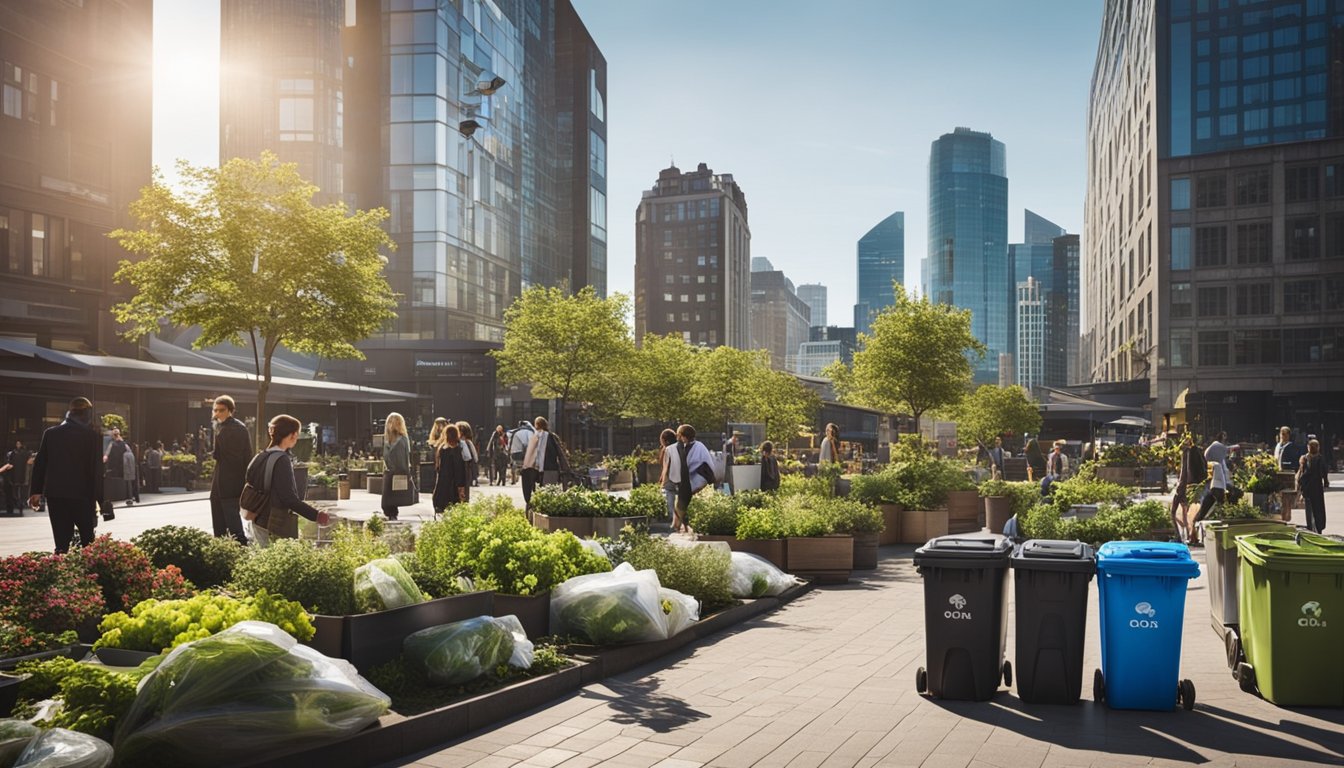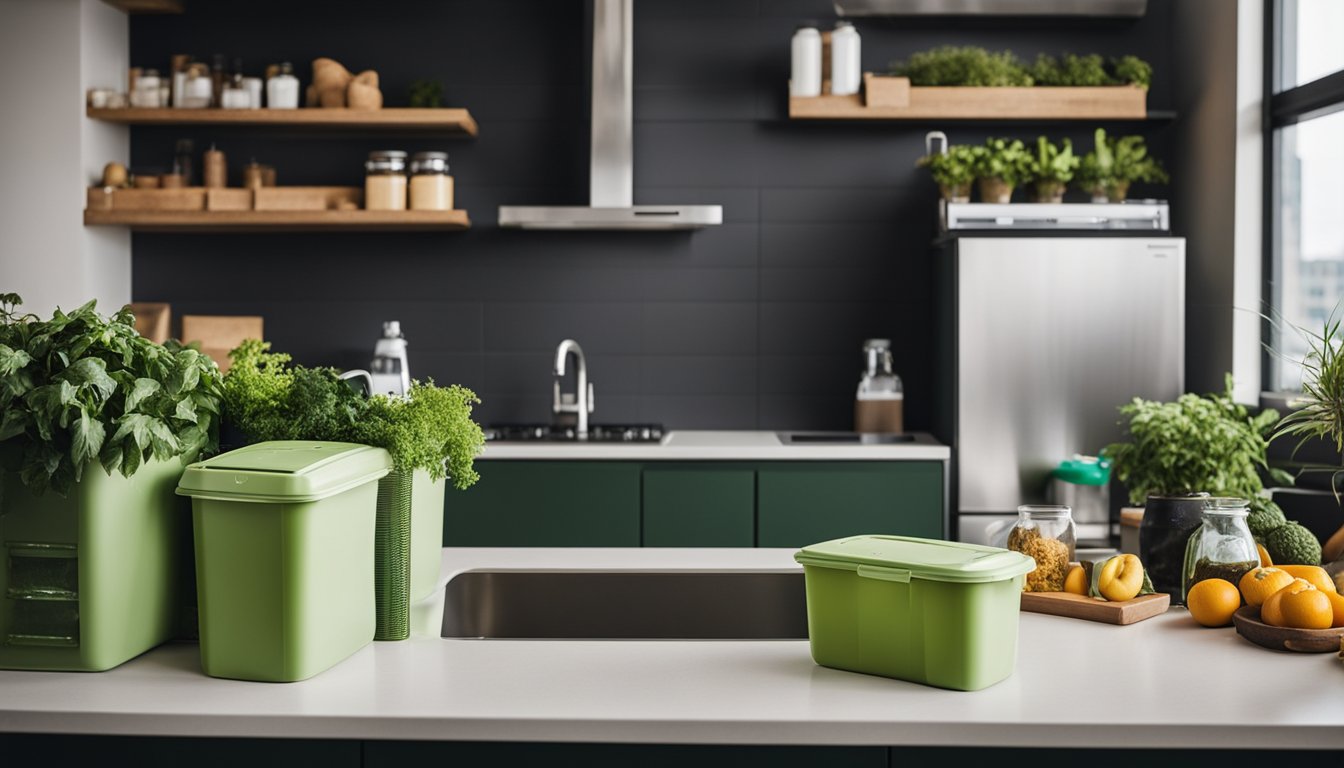Late updated: 26 Sep 2024 14:09
Written by: Sarah Hollister
Innovative Waste-Free Living Tips For Urban Dwellers: Easy Eco-Friendly Practices
In the heart of bustling cities, living a waste-free life might seem daunting. Yet, with a commitment to change, urban dwellers can easily integrate innovative strategies into their daily routines. Embarking on a zero-waste lifestyle not only reduces environmental impact but also enhances our quality of life. By focusing on mindful consumption and sustainable practices, we can lead the shift toward more eco-conscious urban environments.

The key lies in adopting simple yet effective habits. From composting food scraps to supporting local zero-waste stores, every small effort contributes to a broader movement. By creatively repurposing materials and opting for reusable products, we can significantly reduce waste.
Together, let's explore practical and exciting ways to minimise waste. Urban living doesn't have to be at odds with sustainability; instead, we can harmonise city life with our responsibility to the planet.
Key Takeaways
- Start small with zero-waste essentials.
- Adopt practical strategies to reduce urban waste.
- Explore common FAQs for seamless waste reduction.
Starting With the Basics: Essentials of Zero-Waste Living

Adopting a zero-waste lifestyle involves making intentional choices to reduce our ecological footprint. By understanding zero-waste principles and transforming our home environments, we can make credible strides towards more sustainable living.
Understanding Zero-Waste Principles and Sustainability
Zero-waste principles revolve around Refuse, Reduce, Reuse, Recycle, and Rot. These principles guide us to divert resources away from landfills. We start by refusing unnecessary items, especially single-use plastics. Reducing consumption involves prioritising quality over quantity and purchasing sustainable products. Reusing items we already possess helps in minimising waste generation.
Recycling is essential for items that cannot be reused, ensuring they revert into the production cycle. Composting represents the 'Rot' aspect, where organic waste is transformed into valuable soil nutrients. These practices not only contribute to environmental well-being but also promote a more sustainable lifestyle.
The Significance of Personal Choices and Mindful Consumption
Our personal choices play a pivotal role in fostering a sustainable lifestyle. Meal planning is one area where mindful consumption can significantly reduce food waste. By carefully planning meals, we purchase only what's needed and creatively use leftovers, allowing us to cut down on waste.
Switching to reusable containers and sustainable personal care products highlights conscious consumption. This shift indicates our commitment to environmental responsibility. Opting for eco-friendly cleaning solutions further illustrates societal shift toward sustainable practices. Emphasising these choices encourages a mindful outlook, helping reduce waste at an individual level.
Developing an Eco-Friendly Home Environment
An eco-friendly home is foundational to zero-waste living. Simple changes, such as using beeswax wraps instead of cling film or replacing plastic brushes with bamboo alternatives, mark substantial progress. Committing to eco-friendly appliances and sustainable products enhances efficiency and reduces energy consumption.
Recycling bins and composting systems introduce effective waste management strategies. Using a combination of these tools fosters an environment where every household member actively participates in waste reduction efforts. Our home, therefore, becomes more than just a living space; it becomes a symbol of our dedication to a sustainable future.
By integrating these practices into our daily lives, we lay the groundwork for a more sustainable and waste-free existence.
Practical Strategies for Urban Waste Reduction
In our urban environments, reducing waste is not just about sorting rubbish—it's about making intentional choices. By focusing on efficient waste management, the three Rs, sustainable shopping, and community involvement, we can make a significant impact on urban waste reduction.
Effective Waste Management in Urban Settings
Effective waste management in cities is vital. Many urban areas are adopting composting services to handle organic waste, reducing landfill burden. Implementing compost bins at home and community gardens can turn food scraps into useful compost.
We should prioritise responsible disposal methods for hazardous materials and invest in waste reduction technologies like underground waste systems. Incentives for eco-friendly waste practices can also encourage urban residents to participate more actively.
Maximising the Three Rs: Reduce, Reuse, Recycle
Maximising the three Rs is foundational to waste reduction. Reducing waste begins with conscious consumption—opting for products with minimal packaging and carrying reusable shopping bags and water bottles.
Reusing items can be as simple as choosing beeswax wraps over cling film or upcycling old materials into new creations. Regular visits to thrift stores support this practice.
Recycling correctly involves knowing which materials are recyclable in our area and ensuring they're clean and sorted before collection.
Adopting a Sustainable Approach to Shopping and Consumption
Adopting sustainable shopping habits is essential for reducing urban waste. Zero-waste stores provide options for buying products in bulk, which minimises packaging waste. Investing in reusable products like cloth bags and reusable straws ensures we aren't adding to single-use plastic waste.
Clothing purchases should lean towards sustainable fashion, favouring long-lasting garments over fast fashion. By consciously selecting eco-friendly products, we can significantly cut down on waste in urban areas.
Integrating Community into Sustainable Practices
Community plays a crucial role in sustainable urban living. Engaging in community-based waste reduction initiatives can amplify individual efforts. Community composting programmes and local waste workshops can help educate and inspire collective action.
We should also consider joining or forming local eco-groups focused on addressing specific waste challenges in our communities. By fostering a culture of sharing and collaboration, communities can work together towards achieving zero-waste goals.
Involvement in community projects promotes a shared sense of responsibility, making it easier for urban areas to evolve into more sustainable spaces.
Frequently Asked Questions

In urban environments, living waste-free requires specific strategies and habits. We'll explore effective measures for reducing household waste, while adopting daily practices that support a sustainable lifestyle.
How can one significantly minimise household waste contributions in an urban setting?
We can minimise waste by focusing on reducing, reusing, and recycling. Utilising local recycling programmes and choosing products with minimal packaging are key steps. Additionally, frequent use of reusable items like shopping bags, containers, and water bottles can greatly reduce waste output.
What are practical steps to achieving a zero waste lifestyle for city residents?
Adopting a zero waste lifestyle involves making conscious choices about the products we purchase. We should opt for bulk shopping to reduce packaging waste and choose biodegradable products whenever possible. Participating in community swaps or buying second-hand goods can also help minimise waste.
In what ways can urban dwellers implement waste reduction in their daily routines?
Small adjustments in everyday behaviour can lead to significant waste reduction. This includes carrying reusable cutlery and straws, using cloth napkins, and avoiding single-use plastics. Energy-efficient appliances and mindful consumption can further support waste reduction efforts.
Could you suggest daily habits that contribute to a low-waste lifestyle for individuals living in flats?
Living in flats often means limited space for waste disposal. We can manage this by adopting habits such as composting food scraps with compact systems like worm bins. Sorting recyclables and using multi-purpose cleaning products can also help maintain a low-waste lifestyle.
What are efficacious strategies for food waste prevention in urban households?
To prevent food waste, meal planning and proper storage are essential. By planning meals ahead, we can prevent overbuying and make better use of leftovers. Understanding food labels and expiration dates helps ensure food is consumed before it spoils.
How can urbanites effectively embrace minimalism to reduce their waste footprint?
Embracing minimalism involves decluttering our living spaces and being mindful of our consumption habits. We should focus on owning fewer but higher-quality items. This approach not only reduces waste but also encourages a more intentional and sustainable lifestyle.
